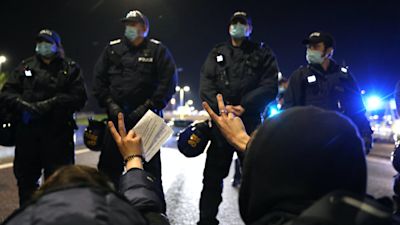Arrests after fifth Bristol ‘Kill the Bill’ protest

Police arrested seven people after a fifth ‘Kill the Bill’ protest in Bristol resulted in disorder.
More than 1,500 people marched through the city on Saturday 3 April in protest at a proposed Police, Crime, Sentencing and Courts Bill.
Demonstrations also took place in other parts of the region, including Bath, Taunton, Exeter and Truro.
But while the majority of those took place peacefully, the event in Bristol was marred by late night disorder - after a small number of protesters occupied the M32 and other parts of the city centre.
Avon and Somerset Police said a “Section 35 Dispersal Order” was issued around midnight after “several instances” of disorder.
The order required all remaining protesters to leave the city centre, and resulted in seven arrests.
‘We had to make arrests’
Superintendent Mark Runacres said it was “disappointing” another peaceful protest had resulted in arrests.
“At around midnight, there were several altercations between the small number of people who remained in the city centre,” he said.
Initial estimates suggested up to 10,000 people might participate in the Bristol protest, the fifth in less than two weeks.
In total, around 1,500 people attended.
After marching through the city centre, police said a small number chose to stay in the city centre.
At around 10.15pm, around 100 protesters marched towards the M32 and occupied one of the lanes.
Supt Runacres said it was safer to allow the protest to continue at this stage than issue a dispersal notice - despite causing delays for some motorists.
“At times, a relatively small group of people did cause significant disruption to motorists as they marched through Bristol and onto the motorway and I understand the frustration that would’ve caused,” he said.
“Our priority is always the safety of the public and like all incidents, we evaluated every action the protestors took based on the threat, harm and risk they posed to themselves and to others.
“Dispersing protestors while they were on a live carriageway presented an unacceptable risk and the safest thing to do was to allow the protest to run its course.”
What is Kill the Bill?
People have been demonstrating against a proposed Police, Crime, Sentencing and Courts Bill, which would give police increased power to stop protests.
The Bill also makes a special new law to protect monuments and statues, in the wake of the toppling of the statue of Edward Colston, with the crime of damaging them punishable by up to ten years in prison.
Under new government proposals trespass would become a criminal offence - rather than being a civil matter - in order to tackle unauthorised encampments, giving police the power to seize vehicles and arrest people who refuse to move.
Those breaking the new law on trespass could be fined up to £2,500 and could face a prison sentence of up to three months, but concerns have been raised by both academics and organisations that the new law will disproportionately affect travellers and more widely those living on roadside camps.
Read more: